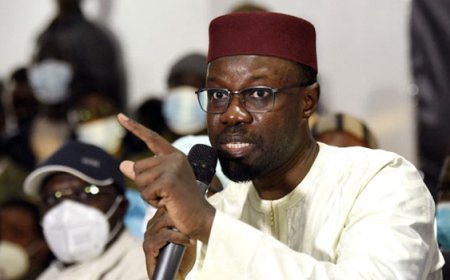Africa and Climate Crises: A Lost Battle
Tempus Omnia Vincit (Time Always Wins)

Introduction
As the Latin saying goes, Tempus Omnia Vincit, which translates to "Time Always Wins." This phrase evokes the relentless march of time and its inevitable influence over events, especially in the context of climate change and Africa's challenges 1. Despite contributing the least to global greenhouse gas emissions in the past century, Africa is disproportionately suffering from the impacts of climate change. This paradox highlights a stark reality: Africa has lost the battle against climate crises even before it fully began. The relentless passage of time aggravates this crisis, leaving the continent struggling to catch up and adapt to a rapidly changing world.
In the 2020 United Nations Environment Programme (UNEP) report,2 it was noted that 14 million used and deterioted vehicles were exported to low- to middle-income countries between 2015 and 2018, with more than half ending up in Africa. Interestingly, the European Union, ranked as the largest exporter, sent approximately 7.5 million vehicles abroad. This trend underscores the broader issue of Africa receiving the leftovers of industrial progress from more developed nations.
Historical Content
To understand Africa's current predicament, we must first consider its historical context. Africa's industrialization and economic development lag far behind those of other continents, primarily due to a legacy of colonial exploitation and continued economic marginalization. In the 19th and early 20th centuries, a century after the Berlin Conference,3 European powers colonized vast regions of Africa, driven by the desire to exploit the continent's abundant natural resources.

The Berlin Conference, November 1884
The Industrial Revolution,4 which began in the late 18th century, transformed Europe and North America with steam engines, mechanized factories, and mass production, leading to unprecedented levels of economic growth and urbanization. While Europe and North America reaped the benefits of industrialization, Africa remained largely excluded from this transformative process. The colonial exploitation of Africa created a cycle of dependency and underdevelopment that persists to this day, leaving the continent at a disadvantage in addressing modern challenges such as climate change.

Industrial Revolution during the 18th - 20th century
The Master's Scraps: Africa's Legacy of Dependence and Undernourishment
Just as Africa is left with the leftovers of industrialized economies, these second-hand 5 goods symbolize a broader legacy of dependence. The influx of obsolete technology not only perpetuates economic reliance on foreign imports but also exacerbates environmental degradation and hampers local industry growth. This cycle of dependence and undernourishment mirrors the broader challenges Africa faces in addressing climate change and sustainable development.

Export of used cars and machines to Africa
The reliance on outdated technologies and the continued investment in importing used equipment, rather than fostering local innovation, reflect a systemic issue where Africa remains at a disadvantage. This disadvantage is compounded by the continent’s struggle to overcome the legacy of being treated as a receptacle for the world's economic scraps, which limits its capacity to effectively tackle climate-related challenges.
The Trap: European Union Climate Policies
The question arises: how will Africa become the battlefield of climate survival? In the global arena, where Europe leads with grand strategies and cutting-edge technologies to reduce emissions 6 and embrace sustainability, Africa remains ensnared in a cycle of dependence and underdevelopment. While European nations implement rigorous policies and invest heavily in green innovations—such as renewable energy sources and electric vehicles—Africa often finds itself receiving the discarded remains of this progress. We find ourselves in a space where not-needed technologies and machines are brought back to Africa to be used. The continent is inundated with outdated technologies, substandard goods, and second-hand resources, including used cars, expired food, and worn-out clothing.

Europe's investment in clean solutions and advanced machinery
In 2021, the EU fortified its climate strategies by introducing the goal of climate neutrality 7 with a legally binding commitment to achieve zero net emissions by 2050. These strategies resulted in a more than 31% drop in EU emissions in 2022 compared to 1990 levels. To finance the Green Deal 8, the European Commission introduced the Sustainable Europe Investment Plan, aiming to attract at least €1 trillion of public and private investment over the next decade. The Just Transition Fund 9, part of this plan, is designed to support regions and communities most affected by the green transition, such as those heavily dependent on coal.
The Transfer: Africa’s Burden of Global Waste
However, Africa’s struggle is not only about receiving outdated goods but also about missing out on the benefits of advanced technologies and investments. The continent’s inability to access and implement cutting-edge solutions further compounds its vulnerability to climate change, demonstrating how time, coupled with historical and economic factors, has created an uneven battlefield.

Africans delighted by the availability of affordable used cars
Africa often becomes the final dumpsite 10 for the discarded waste of global progress. The continent is inundated with outdated technologies and substandard goods—where obsolete machinery, second-hand vehicles, expired food, and worn-out clothing are offloaded. Now, as Europe grapples with its environmental responsibilities, it may soon export even more of its damaged goods and climate-damaging practices to Africa. The shift in the climate battle to Africa's doorstep highlights a troubling reality: the continent is not only dealing with the consequences of a crisis it did little to create but is also becoming a battleground for the world's environmental failures. This transfer of waste and pollution underscores the urgent need for Africa to not only confront climate change but to do so with resources and support that match the scale of the challenge.
Tempus Omnia Vincit: Time Conquers All
The tale of Africa's climate crisis is one where time indeed conquers all. Picture this: centuries ago, Europeans arrived on African shores, drawn by the continent's rich natural and human resources. They exploited these resources, fueling their early industrialization and rapid development. With the spoils of Africa, Europe advanced in every aspect of life—technology, economy, and infrastructure—leaving Africa stripped and struggling.

Africa, once flourishing, is now desolate
Now, fast forward to the present. Africa, once a treasure trove of raw materials, is now a dumping ground for Europe’s discarded goods. The same resources that once powered European progress have left Africa lagging in the race for development. The heavy machinery of the Industrial Revolution that Europe built with Africa's wealth has come full circle. Today, we find ourselves in a grim cycle where Europe's unwanted vehicles, electronics, and substandard products are offloaded back to Africa.
In this chilling narrative, Africa still opens its hands to accept these goods, shackled by a legacy of overdependence. It's as if the ghosts of colonial exploitation haunt us, whispering that we are not yet free from the chains of our past. The remains of Europe's progress clog our ports, roads, and markets, a constant reminder that time, indeed, conquers all. The unstoppable advance of time has brought us to this point where history repeats itself in a hauntingly familiar pattern. And as we stand on this battlefield of survival, it's clear that the fight is far from over.
In the end, Tempus Omnia Vincit—time always wins. The narrative of Africa's climate crisis is one where the ever-persistent flow of time has deepened the scars of colonial exploitation and environmental degradation. Historical injustices have created a cycle of dependence and underdevelopment that perpetuates through generations. The environmental impacts accumulated over decades have left the continent vulnerable, while the slow global response exacerbates these challenges. As time continues its unyielding advance, the urgency for action grows. The next generation will inherit the compounded problems of today, and the choices we make now will determine whether they have the tools and resources to build a sustainable future or are left to fight an even more uphill battle. Time always wins, and it is up to us to ensure that we are not merely reacting to its passage but actively shaping a better future for all.
Echoes of Neglect: Africa's Struggle Against the Unseen Enemy
Africa's ongoing battle against the unseen enemy of climate change is exacerbated by the legacy of European exploitation and the continued influx of outdated technologies and toxic waste from these former colonial powers. Severe floods, extreme heat, and erratic weather patterns displace communities, destroy infrastructure, and disrupt agricultural cycles, further entrenching poverty and economic instability. Europe's pursuit of environmental sustainability paradoxically burdens Africa with second-hand goods that contribute to air pollution and environmental degradation.

Call to Action: Addressing the Hidden Dangers of Toxic Waste Exports
The time has come to confront the hidden dangers of toxic waste exports with urgency and resolve. As we witness the devastating impact of Europe’s discarded technologies on Africa, it is crucial to push for stricter regulations and greater accountability in global waste management. We must advocate for policies that ensure responsible disposal and recycling of electronic waste, and support initiatives that provide developing nations with the resources and technologies they need to combat environmental degradation effectively. By addressing these inequities and fostering global cooperation, we can work towards a future where all nations are treated with respect and can thrive without bearing the brunt of others’ neglect. The health of our planet and the well-being of its people depend on it.
References
- The impact of climate change in Africa - Make Peace Happen 2010
- Used Vehicles and the Environment - United Nations Environment programme
- The Berlin Conference - Oxford Reference
- The First Industrial Revolution - Munich Personal RePEc Archive
- Export Used Cars To Africa - Africa Business Pages
- EU countries approve 2035 phaseout of CO2-emitting cars - Reuters.com
- EU measures against climate change - EU Monitor
- The European Green Deal - Europen Commission
- Just Transition Fund - Europen Commission
- The used car problem - Africa is a Country
What's Your Reaction?























































